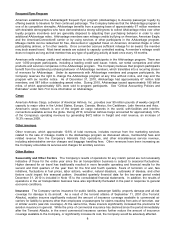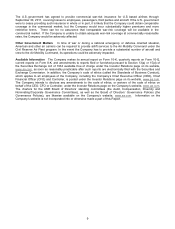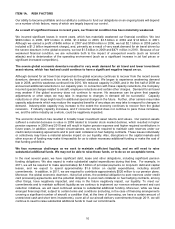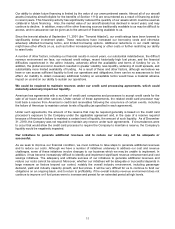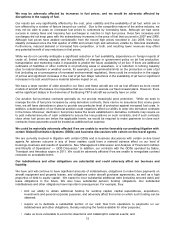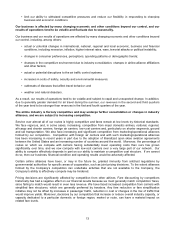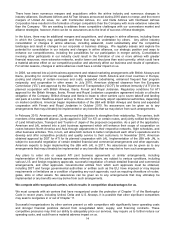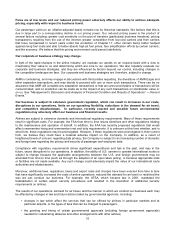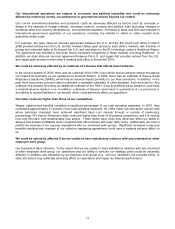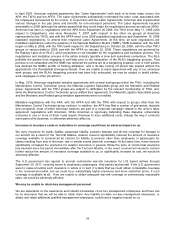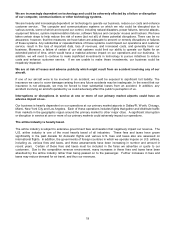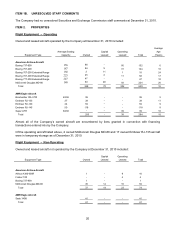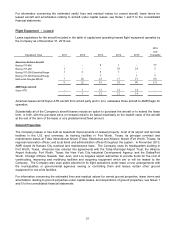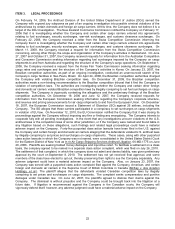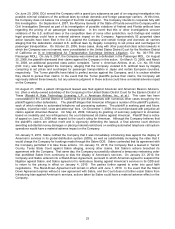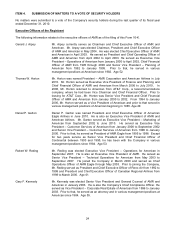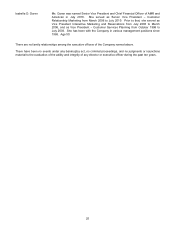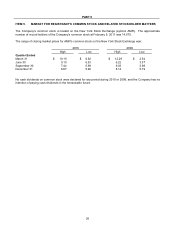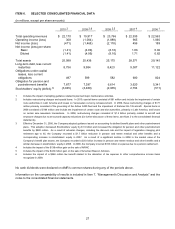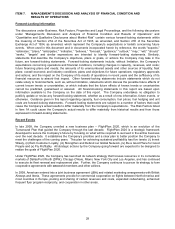American Airlines 2010 Annual Report Download - page 21
Download and view the complete annual report
Please find page 21 of the 2010 American Airlines annual report below. You can navigate through the pages in the report by either clicking on the pages listed below, or by using the keyword search tool below to find specific information within the annual report.
18
In April 2003, American reached agreements (the “Labor Agreements”) with each of its three major unions, the
APA, the TWU) and the APFA. The Labor Agreements substantially moderated the labor costs associated with
the employees represented by the unions. In conjunction with the Labor Agreements, American also implemented
various changes in the pay plans and benefits for non-unionized personnel. The Labor Agreements became
amendable in 2008 (although the parties agreed that they could begin the negotiations process as early as 2006).
American has been in negotiations with the APA since September 20 2006, the TWU since May 11, 2006 (with
respect to Dispatchers), and since November 7, 2007 (with respect to the other six groups at American
represented by the TWU), and with the APFA since June 2008 (expedited negotiations) and September 10, 2008
(standard negotiations), to amend their respective Labor Agreements. At this time, all such negotiations are
mediated negotiations under the auspices of the National Mediation Board (“NMB”). NMB mediation with the APA
began on May 6, 2008, with the TWU (with respect to the Dispatchers) on October 28, 2008, with the other TWU
groups on various dates in 2009, and with the APFA on January 22, 2009. These negotiations are governed by
the Railway Labor Act (“RLA”), which prescribes no set timetable for the negotiations and mediation process. The
negotiations and mediation process in the airline industry typically is slow and sometimes contentious. The RLA
prohibits the parties from engaging in self-help prior to the exhaustion of the RLA’s bargaining process. That
process is not exhausted until the NMB has declared the parties are at a bargaining impasse, one or both parties
has declined the NMB’s proffer of binding arbitration, and a 30-day cooling off period has expired without the
appointment of a Presidential Emergency Board. If we are unable to reach agreement with any of our unionized
work groups, and the RLA’s bargaining process has been fully exhausted, we may be subject to lawful strikes,
work stoppages or other job actions.
In May, 2010, American negotiated tentative agreements with several workgroups within the TWU, including the
Maintenance Control Technician group, the Material Logistics Specialists group and the Mechanic and Related
group. Agreements with the TWU groups are subject to ratification by the relevant membership of TWU, and,
while the Maintenance Control Technician group ratified their agreement, the Material Logistics Specialists group
and the Mechanic and Related group tentative agreements were not ratified.
Mediated negotiations with the APA, with the APFA and with the TWU with respect to groups other than the
Maintenance Control Technician group continue. In addition, the APA has filed a number of grievances, lawsuits
and complaints, most of which American believes are part of a corporate campaign related to the union’s labor
agreement negotiations with American. While American is vigorously defending these disputes, unfavorable
outcomes in one or more of them could require American to incur additional costs, change the way it conducts
some parts of its business, or otherwise adversely affect us.
Increases in insurance costs or reductions in coverage could have an adverse impact on us.
We carry insurance for public liability, passenger liability, property damage and all-risk coverage for damage to
our aircraft. As a result of the Terrorist Attacks, aviation insurers significantly reduced the amount of insurance
coverage available to commercial air carriers for liability to persons other than employees or passengers for
claims resulting from acts of terrorism, war or similar events (war-risk coverage). At the same time, these insurers
significantly increased the premiums for aviation insurance in general. While the price of commercial insurance
has declined since the period immediately after the Terrorist Attacks, in the event commercial insurance carriers
further reduce the amount of insurance coverage available to us, or significantly increase its cost, we would be
adversely affected.
The U.S. government has agreed to provide commercial war-risk insurance for U.S. based airlines through
September 30, 2011, covering losses to employees, passengers, third parties and aircraft. If the U.S. government
were to cease providing such insurance in whole or in part, it is likely that we could obtain comparable coverage
in the commercial market, but we could incur substantially higher premiums and more restrictive terms, if such
coverage is available at all. If we are unable to obtain adequate war-risk coverage at commercially reasonable
rates, we would be adversely affected.
We may be unable to retain key management personnel.
We are dependent on the experience and industry knowledge of our key management employees, and there can
be no assurance that we will be able to retain them. Any inability to retain our key management employees, or
attract and retain additional qualified management employees, could have a negative impact on us.


